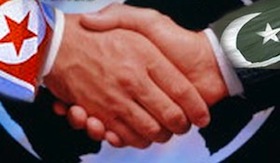North Korea and Pakistan's Nuclear Dealings
July 7, 2011
Featured Image
Today's top nuclear policy stories, with excerpts in bullet form.
Stories we're following today: Thursday, July 7, 2011.
North Korea Paid Pakistanis for Nuclear Technology, Scientist Says - Associated Press [link]
- The founder of Pakistan's nuclear weapons program [Abdul Qadeer Khan] claims that in the late 1990s North Korean officials paid kickbacks to senior Pakistani military figures in exchange for critical weapons technology.
- Khan has given [Simon Henderson of the Washington Institute for Near East Policy] documents that appear to show North Korea's government paid more than $3.5 million to two Pakistani military officials as part of the deal …
- If that's true, it could deepen the distrust between the United States and Pakistan, which are struggling to set aside their differences and cooperate in the battle against militant extremists in Afghanistan and Pakistan.
- The significance of the revelation is in dispute … the assertions by Khan and the details in the letter could not be independently verified.
Dealing With Pakistan's Nuclear Weapons During the Afghanistan Withdrawal - Joel Rubin in Ploughshares Blog [link]
- ... it [is] essential for the United States to have an effective strategy for pulling our troops out of Afghanistan that simultaneously prevents an increase nuclear insecurity in South and Central Asia.
- ... we can't allow nuclear weapons to become to South and Central Asia in the 21st century what al-Qaeda was in the 1990s to Afghanistan. To avoid such an outcome, several key objectives must be included in any Afghanistan withdrawal plan.
- [First,] we must ensure the implementation of a regional approach to military withdrawal … Second, the United States must be mindful to not leave a governance vacuum inside Afghanistan … [third,] it is crucial that we keep a particularly close eye on [India and Pakistan’s nuclear] programs to ensure that all is done to prevent the illicit transfer or ill use of nuclear weapons.
- Taking such steps will help us to depart Afghanistan in a responsible manner, one that protects our security interests while dealing with the deep strategic insecurities of a region that has the greatest risk of nuclear conflict in the world.
Proposed Defense Cuts Aren't All That Deep - William D. Hartung in The Wall Street Journal [link]
- Donald Rumsfeld misses the mark in "The Peril of Deep Defense Cuts." The $400 billion in cuts proposed by the president are far from deep. We are now spending roughly $700 billion per year on defense. In that context, a cut averaging less than $35 billion a year over 12 years is extremely modest.
- The second major flaw in Mr. Rumsfeld's argument is that he is preparing to fight the wrong war. Spending hundreds of billions on troops and big-ticket weapons systems is of little relevance to the most dangerous threats we face.
- The real peril is that we might continue to overfund unnecessary weapons projects at the expense of the most effective tools for fighting terrorism and nuclear proliferation.
Obama’s Nuclear Upgrade - Keir Lieber and Daryl Press in Foreign Affairs [link]
- As the administration cuts the force and talks about a world free of nuclear weapons, it has proposed a major multi-year campaign to replace aging weapons and modernize the U.S. arsenal.
- The administration's modernization programs are merely proposals, and they could be derailed...There are additional reasons -- political, economic, and bureaucratic -- to think that U.S. nuclear modernization plans remain vulnerable.
- Many on the political left remain opposed to modernization, claiming that it will undermine the international nuclear nonproliferation regime... Among congressional moderates and conservatives, meanwhile, political support for nuclear modernization could erode as lawmakers confront increasingly difficult budgetary tradeoffs.
- Moreover, within Washington's bureaucracies, there is little support for nuclear weapons...Defense contractors around Washington, meanwhile, perceive the conventional realm to be more profitable than the nuclear realm.
Obama Nuclear Arms Reduction Blamed for Proliferation Threat - David Shorr in TPMCafe [link]
- The world faces mounting threats of nuclear proliferation in Iran, North Korea, and potentially Saudi Arabia. Do you want to know why? Well according to Peter Brookes of the Heritage Foundation, one major cause is the US administration's own nuclear arms control policy.
- Brookes' New York Post column goes on to catalogue a number of worrisome developments and prospects … All Brookes offers is this breezy observation: “So, while Team Obama spends its time focusing on downsizing our strategic forces and future, others are upsizing theirs. Coincidence? Probably not.”
- Brookes seems to take the radical and naive view that the size of America's nuclear arsenal will in itself prevent new countries from obtaining nuclear weapons … I'm glad to say that Peter's approach represents the far-Right rather than the sober conservative view within the GOP.



